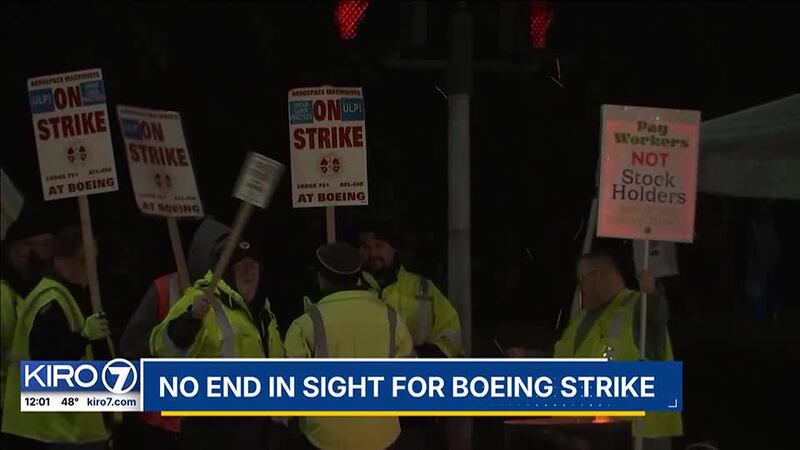EVERETT, Wash. — Workers in the Machinists union returned to the picket line after 64% voted to reject Boeing’s latest contract offer.
The vote came on Wednesday, the same day the company reported a third-quarter loss of more than $6 billion.
“After 10 years of sacrifices, we still have ground to make up, and we’re hopeful to do so by resuming negotiations promptly. This is workplace democracy – and also clear evidence that there are consequences when a company mistreats its workers year after year,” a joint statement from union leaders Jon Holden and Brandon Bryant said, in part.
During the strike that’s spanned the past five weeks, some workers took other jobs and lost their health insurance. Meanwhile, without union workers, Boeing can’t produce any new 737s, and workers told us they’re in it for the long haul until they get what they want.
Boeing’s latest proposal included a 35% wage increase over four years, with 12% in the first year.
Other perks in the contract included:
- Incentive plan reinstated with a minimum 4% annual payout.
- Company 401K match raised to 100% of the first 8% contributed and a one-time $5,000 deposit to the fund by the company.
- Lump sum payment of $7,000 if the contract is accepted.
Bringing back a pension has been a major sticking point during negotiations. Boeing officials have said there is no scenario in which the benefit would return and have said it’s too expensive.
“A pension would provide people a sense of security to want to put the time and effort into this company and to stay,” said employee Sam Peltonen.
Many striking workers told us they were unhappy with the latest offer.
“I expect our union, our union leaders, to go and bargain it out,” said employee Bartley Stokes. “Get it. Get us what we deserve.”
Stokes said this is his fourth or fifth strike with the company, and he feels workers should be compensated fairly.
“We’re not asking for anything more than what we think we deserve,” said employee Ken Stewart.
KIRO 7 asked Seattle University Department of Management professor, Dr. Marc Cohen, about how both sides will move forward.
“I think it’s a super difficult situation because the union and Boeing management are not negotiating as partners. They see themselves as fundamentally opposed,” Cohen said.
Cohen said he understood why most businesses are no longer providing pensions, but believes many of Boeing’s financial losses are “self-inflicted.” He blamed, in part, the company’s previous stock buyback programs, which were paused in 2019.
“I think the problem is not necessarily the employees or wages or pension,” Cohen said.
©2024 Cox Media Group








